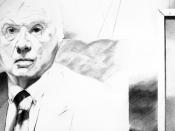In this interview, Bacon discusses his creative process and it's relationship to his perception of reality: "When talking about the violence of paint, it has nothing to do with violence of war, it's to do with an attempt to remake the violence of reality itself." (81) Bacon's ideas can be attributed to the creative process in general in the sense that an artist can describe universal truths based on intuitive and unselfconscious insight. The artist's individual ability to experience reality is the most important element, this enables the artist to create something which explores a subject beyond it's surface. "The violence of paint" can parallel any adjective and medium, such as the loneliness of wood, or the anxiety of plastic. The material becomes the idea, transcending its superficial characteristics. "The violence of reality" is understood as a quintessential vision that absorbs the overtones, undertones, and textures of physical and mental reality while revealing what is behind "the screened existence."
The "screened existence" that Bacon talks about is the everyday life routine that people imprison themselves, not able to face or talk about the truth or core of a problem in a certain situation. Bacon felt that he was sometimes successful in removing this screen. He was able to convey, through paint, the emanation of a person's personality. (82) The violence and distortion in Bacon's paintings revealed the internal chemistry and soul of both Bacon and his subject. Bacon's idea of screened existence can be interpreted on different levels, from individual, personal relationships, to community, government, war, etc.
Bacon's view of individual freedom and social injustice helps clarify the function and purpose of art. Bacon says that " ...so far one remembers a society for what it has created." He states that he is "...not upset by the fact that people do suffer, because I think that the suffering of people and the differences between people are what have made great art, and not egalitarianism." The artist has been able to analyze the culture of it's time, based on suffering, differences between people, and other issues. A perfect society has not been created thus far in the history of human civilization. How would an artist react to a perfect society, with regard to art history?
Bacon discusses the challenge of painting, which is to see beyond "the accepted standards of what appearance is." He says that '...it will only catch the mystery of reality if the painter doesn't know how to do it." This relates to the problem of modern art: developing an allegory to illusion.

